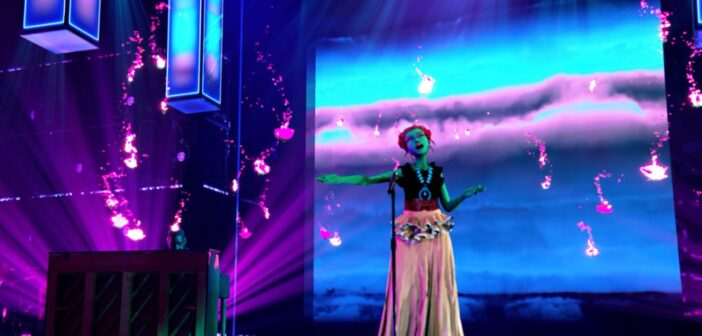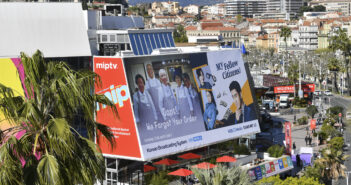Metaverse & the future of TV Industry
Since the pandemic hit last year, there has been an extensive expansion and growth within the world of virtual events.From Digital MIP over virtual theatre performances to concerts on Fortnite and Roblox, the concept of bringing experiences to audiences is thriving within the virtual realm, even as we’re coming out of the pandemic. And with that, everyone is talking about the Metaverse. But what is the “metaverse” and what does it have to do with the future of the TV industry?
What is metaverse ?
The term “metaverse” was first coined in Neal Stephenson’s 1992 sci-fi novel, Snow Crash, as a concept that blends digital and physical existence. It is typically used to describe the concept of a future iteration of the internet, made up of persistent, shared, 3D virtual spaces linked into a perceived virtual universe. It removes the barriers between genres and aesthetics, allowing users to blend various types of characters, settings, and other activities into a seamless experience.
Some key characteristics
In January 2020, an influential essay by the venture capitalist Matthew Ball set out to identify key characteristics of a “metaverse”. Among them are:
- it has to span the physical and virtual worlds
- contain a fully fledged economy
- offer “unprecedented interoperability”
Users have to be able to take their avatars and goods from one place in the metaverse to another, no matter who runs that particular part of it. This means one moment you could participate in a VR meeting on Facebook’s Horizon Workrooms and in the next check-in with your friends on Snapchat and then use the same avatar to play in Fortnite.
What does it mean for TV ?
Experts say we’re still a decade away from it coming to fruition, but here’s a taste of what the metaverse and TechTainment (= intersection of tech and entertainment) mean for TV.
Right now, most of us interact with the “metaverse“ through consumer-facing, interactive and immersive virtual platforms, such as video games, AR and VR experiences, and social media. The social gamer space is paving the way for the future of online and offline experiences, creating huge opportunities for TV brands and properties, and in turn extending their online presence to reach more diverse and engaged audiences.
One interesting example is Fox’s new talent show Alter Ego where singers become the stars, they’ve always wanted to be through their dream avatar. In a recent Rolling Stone interview, one of the judges will.i.am said, after watching the Alter Egos, he sparked up about the possibilities of developing Metaverse-level talent and how to keep working with the avatars after the show ended.

Alter Ego. Photo: Propagate Content International
In theory, the winner of Alter Ego could go on to fill their calendar with shows without ever having to be seen in the flesh. They could perform in Fortnite and Roblox, like stars such as Travis Scott, Lil Nas X, and Ariana Grande have already been doing in the past year.
Brands are catching on
Fortnite and Roblox are obviously at the forefront of the “metaverse experiences“ and brands are catching on. One of the front runners at the moment is Gucci, having created a pair of virtual sneakers that you could wear on Instagram using AR filters, as well as in Decentraland (a 3D VR platform) and in Roblox. “We know that the world is moving toward the metaverse,” said Lady PheOnix, founder of Crypto Fashion Week. “We know that everyone will have an avatar in the future. Those who want to be fashionable IRL also want to be fashionable in the metaverse.”
For the Meta Gala, NYX Professional Makeup unveiled its first NFT (non-fungible tokens) as part of the official “Meta Gala red carpet” event featuring virtual fashion and beauty looks. The NYX Cosmetics look was first created in real life by special-effects makeup artist Mimi Choi, with a digital version and avatar created via a hologram capture. A digital version of the makeup look was minted into an NFT in the format of an AR filter, which Meta Gala site visitors could enter to win in a giveaway. A digital version of Choi modeling the makeup look while wearing a Rebecca Minkoff outfit was featured in the fashion show.
It’s easy to see the “metaverse” versions of reality shows such as Project Runway, Grand Designs, and Face Off.
The latest metaverse news came from Facebook when the social media recently announced changing its name to “Meta” as part of a rebrand meant to highlight the company’s new focus. CEO Mark Zuckerberg said in a keynote address at Facebook Connect, the company’s annual in-house virtual reality conference: “From now on, we’re going to be metaverse first, not Facebook first.”

The mosaic of Mark Zuckerberg is made up of around 1,000 photographs and was specially produced for the FT by London-based visual artist Helen Marshall of The People’s Picture. ©The People’s Picture
However, there is still a long way to go before mass adoption, and some of the challenges along the way will include technological capabilities, the closed walled systems, IP issues and law frameworks issues. Right now corporations are not set up to embrace the metaverse. But Gen Alpha are already “metaverse ready” thanks to Roblox and Fortnite and brands that add value to current and new virtual spaces have the chance to become well-loved.
TV Trends in your inbox? Fill in your details to subscribe to the MIP Newsletter →
For more information on TV Trends, attend MIPCOM and MIPTV
You can read also :
What do television brands and properties need to do to be metaverse-ready?
Tweens : The overlooked generation




